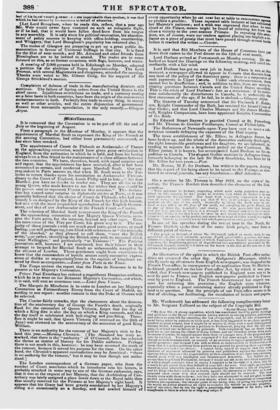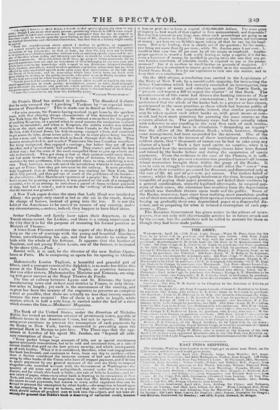Mr. Wordsworth has addressed the following complimentary letter to Mr.
Sergeant Talfourd on the subject of the Copyright Bill. tired Mount, 15th April 1838. "My dear Sir—A strong opposition, which has manifested itself by public meetings and !editions to the floes,. id Commons having started up among printers, publishers, and others to your bill for amending the law of copyrights, and HO like couutermove- ment being made by atttltors on their part, it has been suggested to me, from quitters entitled to great respect, that it might Inc of service if, idong aid, a most distinguished literary friend, I should present a petition to Parliament, praying that the bill may pass, or at had one its favour of its principle. This compliment has no doubt bees paid me as one among the oldest of living a riters, and one therefore whose heirs must, in course of nature, be injured sooner than those of !ounger men. if the proposed meet sure be rejected. Yott will uot be surprised if I feel some scruple in taking a dry, though so well recommended, on account of an aversion to appear prominently in any public question ; and because I am loth to think so unfavourably of Parliaments,' le deem that it recut ires petitions from authors as a ground for graining thou it privilege. the justice of waielt it. so obvious. I cannot bring myself to suppose that the mere shadows of orgionent advanced by printers and publishers agatust the elm class to whom they owe the respectability or their condition, if net their very existence, should avail a ii In any intelligent and disinterested Assembly. Yet further arn I averse thus to petition Parliament, because I would not ask as an India itlual suppliant, or with single associate, shot in equity I consider to be the right of a class, and for ow of a much loager period than that defined in your bill—for ever. Such right, as you leol stated in your admirable speech, a as acknowledged by the common law of huglaud. and let them %Ins hat e cried out so loudly against the extension of the tune as Is tiow proposed show cause ally that original right should not be restored. 1 he our clearly rests with them Lotto so; but they have not attempted it, and are glad I° tat ° wiener under the statute law as it now stands, which is it composition or compromise betweeu two opinions; the extreme point of one being, that, the world, an author abandons all right to consider the vehicle as private .propenT; and of the other, that he hoe Ms right is pevetuity.that dewed* to Ale heir', and I traeuferable to these le wheel he yr they say assign it. by giving his thoughts t■ his right I hold 10 lq• more deem./ i..he.roa ta that ,ptors of py..y..rty 11111* (Ing that man) person... perceiving whereto it differs nom acqui. thee • though I am avian.
de awl commerce. have contended that the law in respect to
other; made in tra 11,,,,,tare might to remain upon the same footing as that Which regards the profits of mechanical inventions awl chemical thscovet ire ; but that this is a fallacy might easily brproVerb
1. From the considerations Waive stated. I decline to petition. as suggested.
sna content myself.i the silence ur others better entitled to speak, anti this public .froomio, or my imivum,t; so. tha0. at least, my dear Sir, y 00 May Dot lie liable to be treated its a volunterr intruding w lanit wish or sanction openly expressed by an% co, of the class abuse rights !knit interests you have so much to our honour stepped SOrsidil to maintain Here this letter shall close, ija;impose being unsorted : for no rueral arguments fhom iii'. and no tit!ttemeut of hiets belonging to my own case. and Which have come to my kilos ledge with respect to my illustrious triends Celeridge, $reti, sontbey, and otInTs. would avail to produce cow iction, %there that has ,,, Item effected by your unrivalled speech made upon )(air first intrisloctitm of the bill into the !Tome of Commons, awl lw rrartougs %%hick have lately been set forth with at ability by a titers in the public .votirtials, oho were more at liherty to enter into .57„,,, Mimi )011 Conk% he %bile treatiug the subject bee.,.. Path:wield
(which I cannot allots In> sclf to War) by the bite-
,. Should your bill be overborn.t. 00.,l opposition now at work, justice, nevertheless, sooner or later, most triumph ; sod at all events the respect and gratitude "hick authors tee/ too arils you and your eesajutors upon this oc^asion will be cherislu.11 by them to the lust Imor of their "I bare the honour 10 he, my dear Sir. faithfully yours. 11 WILLIAM WoRDsWOR1 II."



























 Previous page
Previous page